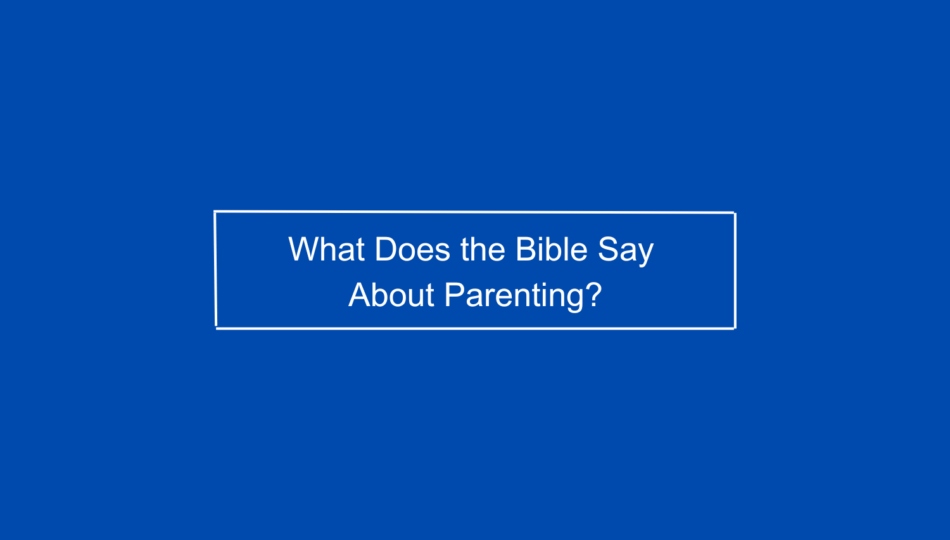Something must be incredibly important, basic, and possible in parenthood if being parents is part of the primary command God gave to the mother and father of the human race (Gen 1:28). True, reproduction was necessary to continue the generations but to see children as simply the by-product of a biological function is to miss completely the divine significance attached to parenthood (Psalm 127-128).
God made us in His image (Gen. 1:27), and nothing reveals the true nature of His deity any more than God’s loving creation of human life. How could man and woman more unambiguously reflect that characteristic of God than in their own loving procreation of a child?
The Bible contains clear principles for rearing children in the nurture and admonition of the Lord.
What the Bible Says About Fatherhood
A child’s earliest concept of God is greatly impacted by the relationship she has with her own father. Fathers in the Bible were the supreme authoritative figures in their families. With but a word they could determine the fate of their offspring. In contrast to this autocratic image of fatherhood, Paul’s advice to fathers emphasizes patience (Ephesians 6:4). The father Jesus describes, just as the heavenly Father, loves unconditionally, forgives without strings attached, and gives abundantly (Luke 15:11-32).
Still, Scripture presents a tender side to fatherhood. The best earthly father is one who has a vibrant fellowship with the heavenly Father and thus has access to the Lord’s unlimited wisdom and vast resources.
A mother helps to fashion a good father. She makes him feel loved and accepted, treating him with respect. She shows respect for his position of leadership. She does not undermine his authority. She offers encouragement, reflective interaction, and supportive interest.
Fathers certainly are reminded of the importance of making their children feel wanted (Psalm 127:3-5). Fathers are to instruct their children (Proverbs 4:1), train them (Psalms 78:5-7), and correct them (Proverbs 13:24). The shelter and security provided by a godly father should give freedom for growth without overprotective from challenges or tasks that teach responsibility (1 Sam 3:1-10).
What the Bible Says About Motherhood
More than a job or responsibility, mothering is a ministry. Most assuredly it takes work! It means sacrifice. Children do not come off an assembly line, nor are they the by-product of an impersonal biological process; they are to be lovingly nurtured by their mothers (2 Timothy 1:3-5). Mothers divide time among their children but multiply their love for all their children. To this they add the care of the home, often subtracting many extras in order to do so.
When Isaiah the prophet searched for an illustration of God’s constant love for His people, the best example he could find was a new baby’s mother (Isaiah 49:15). Mothers have enduring love that even the most trying circumstances or rebellious child cannot dim. As a mother lets go of her own life for the sake of her child, she is reminded of the depth and height and breadth of God’s love for her, and in a unique way she experiences the true joy of motherhood. This is a truth that will transform any suffering or sacrifice into reward and joy (1 John 3:16).
God has a plan for mothers (Ex. 2:1-10). The high calling is an all-consuming task (Deut. 6:6-7): in the morning, you can read God’s Word to your child; at mealtime, you are to give attention to meeting physical needs; as you are outside, you can teach your child about the beauty of creation; at bedtime, you can pray for your child and give assurance. The reward is worth the effort (Prov. 31:28).
What the Bible Says About Infertility
Most couples anticipate children after marriage. Scripture teaches that children are a heritage from the Lord, a reward from God (Ps. 127:3-5). Therefore, it can become very confusing and discouraging to a married couple when children are not conceived as planned or desired. This was especially true in Bible times.
Couples who face infertility can experience a wide range of emotions. Like Sarai (Gen. 11:30), Rachel (Gen. 30:1), Hannah (1 Sam. 1:2), and Elizabeth (Luke 1:36), a childless woman often feels a wide range of emotions: disappointment, helplessness, anger, self-pity, grief, low self-esteem, or guilt.
Fellow Christians can help heal this pain by offering encouragement and understanding, by respecting the couple’s efforts to explore their options, and by talking freely about infertility when the subject is introduced. Most importantly, the church needs to accept childless couples and encourage them to discover and pursue outlets for ministry.
God does not give children to every couple. God may have other blessings in store for the childless. Though we can only speculate as to their family lives, none of these notable women in the Bible are associated with the bearing of children: Miriam, Esther, Priscilla, Mary and Martha, Mary Magdalene. Once a woman realizes that the rearing of children is not the only responsibility God assigns to Christian couples, she often finds true joy in embracing her personal assignment from God.
#################
Content in this article is taken from The Woman’s Study Bible







1 reply on “What Does the Bible Say About Parenting?”
Great resource. What principles can be applied to single mothers. Especially of young boys with no male authoritive figure. Does the woman be both roles the best she can?